Palestine calls on the international community to break its silence and "take serious action" to stop Israeli aggression after Tel Aviv kills at least nine Palestinians.

REUTERS
Dozens of Palestinians were also injured in the air and missile assault carried out by Israeli armed forces in the occupied West Bank cities of Jenin and Al Bireh.
The Palestinian Authority has decided to suspend all forms of contact and security coordination with Israel after the Israeli army raided the occupied West Bank city of Jenin.
"The Palestinian leadership decides to stop all contacts and meetings with the Israeli side and to continue with halting the security coordination in response to the Israeli aggression on Jenin," said Palestinian presidency spokesperson Nabil Abu Rudeineh following a meeting of the Palestinian leadership in Ramallah on Monday.
He added that all recent understandings and commitments with Israel reached at the Aqaba and Sharm El Sheikh meetings "no longer exist."
The meetings were held on Feb. 26 and March 19, respectively, to restore calm across the Palestinian territories.
Earlier, Palestine condemned the Israeli military as a "new war crime" against Palestinians.
"What the Israeli occupation government is doing in the city of Jenin and its camp is a new war crime against our defenceless people," Abu Rudeineh said in a statement.
"The Palestinian people will not surrender or raise the white flag, but will remain steadfast on their land in the face of this brutal aggression until the occupation is defeated and freedom is achieved," he added.
At least nine Palestinians were killed by Israeli army fire early Monday, including eight in Jenin, according to the Palestinian Health Ministry. At least 50 Palestinians were also injured.
Abu Rudeineh said "crimes" committed by Israel and settlers "will not achieve security and stability for them unless our Palestinian people also feel them."
He also called on the international community “to break its shameful silence and take serious action to compel Israel to stop its aggression against our Palestinian people, and to hold it accountable for all these crimes.”

'Barbaric aggression'
For its part, the Palestinian Foreign Ministry termed the Jenin raid as a “barbaric aggression”, saying it was part of Israel’s official policy “of using military force in dealing with the defenceless Palestinian people as an alternative to political solutions to the conflict."
The ministry called for urgent international action to "immediately stop the aggression,” and urged the International Criminal Court “to break its silence and start holding the Israel war criminals accountable.”
Israeli army spokesman Daniel Hagari said the "military operation" was focused on the Jenin refugee camp and was “part of a series of actions that we carry out and will continue to carry out.”
OIC condemns Israeli raid
The Organization of Islamic Cooperation (OIC) on Monday also condemned the Israeli raid in the Palestinian city of Jenin in the occupied West Bank.
“This heinous crime constitutes an extension of crimes and organised state terrorism practised by the Israeli occupation against the Palestinian people,” the OIC said in a statement.
The Jeddah-based grouping held Israel responsible for the "repercussions" of the incident that "calls for investigation and accountability.”
The OIC called on the UN Security Council to “take responsibility, enforce its relevant resolutions, put an end to this continuous Israeli terrorism, and provide protection for the Palestinian people.”
Tensions have been running high across the occupied West Bank in recent months amid repeated Israeli raids into Palestinian towns.
Nearly 190 Palestinians have been killed by Israeli forces since the start of this year, according to the Health Ministry. At least 25 Israelis have also been killed in separate attacks during the same period.
The operation began shortly after 1am (local time) with drone attacks from the air on what it called “terrorist infrastructure” in the Jenin area: Israeli army
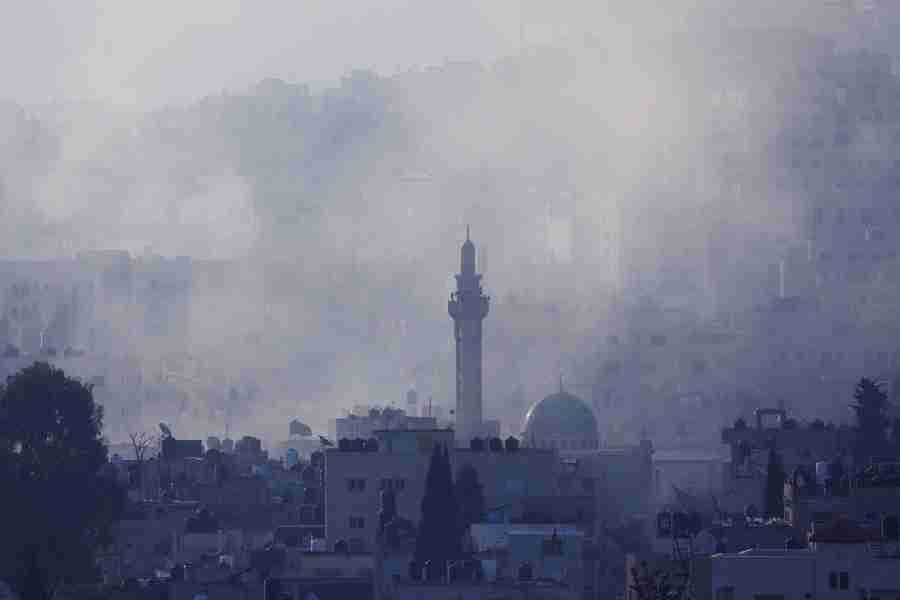
Smoke rises during an Israeli military operation in the Israeli-occupied West Bank on Monday
Israel launched the most intense airstrikes on the occupied West Bank in nearly two decades on Monday, saying it was trying to root out armed militants in the city of Jenin after a year of escalating violence there. At least eight Palestinians were killed.
The Israeli military said the operation began shortly after 1am (local time) with drone attacks from the air on what it called “terrorist infrastructure” in the Jenin area, followed by hundreds of ground forces moving in. Military officials said the operation focused on militant targets in the densely populated Jenin refugee camp, an area of less than a quarter of a square mile abutting the city, with about 17,000 residents
Israel estimates that there are hundreds of armed Palestinian militants in the Jenin area, which has recently been the focus of attacks against Israelis and deadly Israeli Army arrest raids.
Long a symbol of Palestinian militancy and a haven for armed groups opposing Israel’s occupation of the West Bank, Jenin is a stronghold of the Iran-backed Islamic Jihad group and of Hamas, the Islamic militant group that controls the Palestinian enclave of Gaza. Israeli military officials say more than 50 shooting attacks have been carried out from the Jenin area against Israeli targets in the past six months.
Army arrest raids have led to increasingly fierce exchanges of fire between the troops and the militants, prompting Monday’s incursion.
“The camp is a war zone in the full meaning of the word,” Muhammad Sbaghi, a member of the local committee that helps administer the Jenin camp, said after the operation began on Monday. He added that residents had feared a large-scale incursion by the Israeli military but had not expected something so violent and destructive.
“The occupation army is vindictively targeting us,” he said. “People are terrified,” he added, saying that residents were holed up in their homes throughout the Jenin refugee camp.
A spokesman for the Israeli military, Lt. Col. Richard Hecht, said the goal of the Israeli operation was “to break the safe-haven mindset” of the refugee camp. At least 19 people suspected of attacks on Israelis had found shelter there in recent months, according to the military.
Colonel Hecht said the airstrikes were intended to “minimise friction” on the ground and the risk to Israeli troops, adding that the assault would go on for “as long as needed”. Ground forces inside the camp were seizing weapons, he said.
Israeli media reports estimated that about 1,000 ground troops were in Jenin as part of the operation.
The Palestinian health ministry confirmed that at least eight Palestinians had been killed in Jenin and about 50 were wounded, 10 of them gravely. Israel said it had killed at least seven. The military described Jenin as “an active combat area”.
New York Times News Service
Major Israel army raid kills nine Palestinians in West Bank
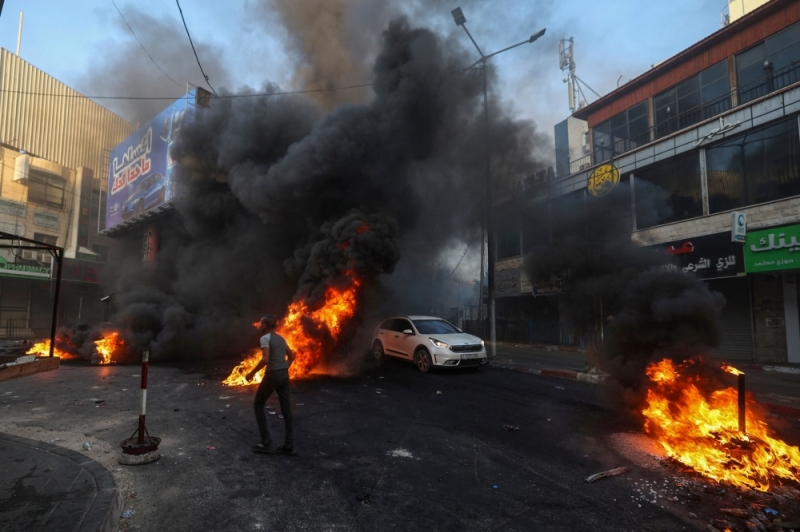
JENIN, July 4 — Israeli forces killed nine Palestinians in a large-scale operation yesterday in the occupied West Bank that the army labelled an “extensive counterterrorism effort,” involving air strikes and hundreds of troops.
The raid, launched under Prime Minister Benjamin Netanyahu’s hard-right government, targeted the northern city of Jenin and was the biggest in the West Bank for years, featuring armoured vehicles, army bulldozers and drones.
Since the start of the operation in the early hours of yesterday about 3,000 people had left their homes in the Jenin refugee camp, deputy governor of Jenin, Kamal Abu al-Roub told AFP, adding arrangements were being made to house them in schools and other shelters in the city of Jenin.
Firefights and explosions rocked the city and adjacent refugee camp, a militant stronghold home to about 18,000 people, as Palestinians threw rocks at soldiers and smoke from blasts and burning barricades darkened the sky, an AFP correspondent said.
“There is bombing from the air and an invasion on the ground,” said Mahmoud al-Saadi, director of the Palestinian Red Crescent in Jenin.
“Several houses and sites have been bombed... smoke is rising from everywhere.”
Nine people were killed and 100 others wounded, 20 of them seriously, the Palestinian health ministry said — exceeding the toll of seven dead in an Israeli raid in Jenin two weeks ago which saw the rare use of helicopter missile fire.
Netanyahu said in a statement that Israeli forces in “the nest of terrorists in Jenin” were “destroying command centres and seizing considerable weaponry”.
The Palestinian foreign ministry called the escalation “an open war against the people of Jenin”.
Army spokesman Daniel Hagari told reporters that Israeli troops did “not intend to stay in the camp”, but “we are getting ready for the more severe situation” of prolonged fighting.
The army said soldiers and gunmen exchanged fire at a mosque in the Jenin camp and that weapons and explosives were later found in the building.
Jenin resident Badr Shagoul told AFP: “I saw them taking bulldozers into the camp, they were destroying buildings... These were people’s homes.”
At a hospital morgue some bodies were covered in blankets and others were heavily bandaged, an AFP correspondent said, adding that the fighting continued into the late evening.
“In the last five years, this is the worst raid,” nurse Qasem Benighader said, noting “many” patients with bullet wounds and injuries from explosives.
Israel had already stepped up operations in the northern West Bank, which has seen a recent spate of attacks on Israelis as well as Jewish settler violence targeting Palestinians.
Jenin camp resident Mahmoud Hawashin called the situation “catastrophic”, and predicted that “if there is more Palestinian blood shed, there will be more Israeli blood shed.”
UN Secretary-General Antonio Guterres is “deeply concerned” about the violence, and called for the respect of international humanitarian law, a spokesman said in a statement.
‘Escalating campaigns’
The Palestinian militant group Islamic Jihad said “all options are open to strike the enemy in response to its aggression in Jenin”.
The United States said ally Israel had a right to “defend its people against... terrorist groups” but called for protection of civilians.
The Arab League said it will convene an emergency meeting Tuesday to discuss “an Arab mobilisation to counter the Israeli attack on Jenin”.
Neighbouring Jordan called the raid “a clear violation of international humanitarian law”, while the United Arab Emirates urged “the immediate halt of repeated and escalating campaigns against the Palestinian people”.
Earlier yesterday the army said it had struck a “joint operations centre” of a group called the Jenin Brigade, a weapons depot, an “observation and reconnaissance” site and a hideout for alleged attackers of Israeli targets.
Army spokesman Richard Hecht said troops were after “specific targets”, adding the operation had no defined timeline.
Israeli-Palestinian violence has worsened since last year, and escalated further under the Netanyahu coalition government that includes extreme-right allies.
The Jenin area is nominally controlled by president Mahmud Abbas’s Palestinian Authority, which has partial administrative control in the West Bank.
In a separate incident, Israeli fire killed a Palestinian youth near the West Bank city of Ramallah, the Palestinian health ministry said.
Settlements
Israel has occupied the West Bank since the Six-Day War of 1967.
Excluding annexed east Jerusalem, the territory is now home to around 490,000 Israelis in settlements considered illegal under international law.
The Palestinians, who seek their own independent state, want Israel to withdraw from all land it seized in 1967 and to dismantle all Jewish settlements.
Netanyahu, however, has pledged to “strengthen settlements” and expressed no interest in reviving peace talks, moribund since 2014.
After last month’s Jenin raid, four Israelis were killed by two Palestinian gunmen — who were shot dead — near the West Bank settlement of Eli.
That same week, Israel said a drone strike killed three members of a “terrorist cell” in the West Bank.
At least 186 Palestinians, 25 Israelis, one Ukrainian and one Italian have been killed this year, according to an AFP tally compiled from official sources from both sides.
They include, on the Palestinian side, combatants and civilians, and on the Israeli side, mostly civilians and three members of the Arab minority. — AFP
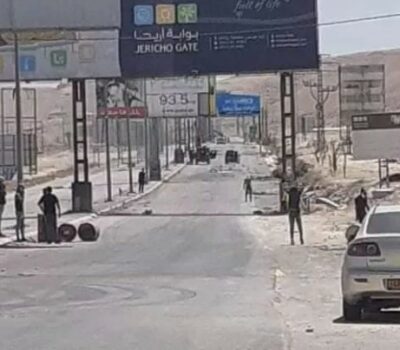
On Tuesday dawn, Israeli soldiers shot a young Palestinian man at the entrance of Jericho city, in the occupied West Bank’s northeastern part.
Media sources said dozens of Palestinians protested the ongoing Israeli offensive on Jenin before the soldiers attacked them with live rounds, rubber-coated steel bullets, and gas bombs.
They added that the soldiers shot a young man with a live round in the leg and caused several Palestinians to suffer the effects of tear gas inhalation.
The soldiers also completely sealed Jericho’s entrance, preventing the Palestinians from entering or leaving the city.
On Monday night, Israeli soldiers shot two young Palestinian men in Beit Ummar town, north of Hebron, in the occupied West Bank’s southern part.
Earlier Monday, Israeli war jets fired many missiles into the Jenin refugee camp in the northern West Bank city of Jenin, killing at least eight Palestinians, including a child, and wounding more than fifty, ten seriously, including gunshot wounds to the head and the back, as the army advanced into the area and surrounded it.
Late Monday night, the soldiers killed a teenage boy, Mustafa Nidal Al-Qassem, 17, in the Jenin refugee camp.
Furthermore, the soldiers killed Mohammad Emad Hassanein, 21, at the entrance of the Al-Biereh city in the central West Bank.
In Bethlehem, the soldiers attacked Palestinian protesters in several areas of Bethlehem, in the occupied West Bank, wounding many, including two children
Israeli troops and drones hit Jenin in
major West Bank operation
By Ali Sawafta for Reuters
Palestinians walk past burned waste during an Israeli military operation in the Jenin refugee camp in the occupied West Bank on 3 July, 2023. Photo: AFP / Jaafar Ashtiyeh
Israeli forces hit the city of Jenin with drone strikes on Monday as part of one of the biggest West Bank operations in 20 years, killing at least eight Palestinians and involving hundreds of troops in sporadic gun battles that continued into the evening.
Gunfire and explosions were heard throughout the day as clashes continued between Israeli troops and fighters from the Jenin Brigades, a unit made up of militant groups based in the city's crowded refugee camp.
"What is going on in the refugee camp is real war," said Palestinian ambulance driver Khaled Alahmad. "There were strikes from the sky targeting the camp, every time we drive in, around five to seven ambulances and we come back full of injured."
At times during the morning, at least six drones could be seen circling over the city and the adjoining camp, a densely packed area housing around 14,000 refugees in less than half a square kilometre.
The camp has been at the heart of an escalation of violence across the West Bank that has triggered mounting alarm from Washington to the Arab world, without so far opening the way to a resumption of political negotiations that have been stalled for almost a decade.
For more than a year, army raids in cities such as Jenin have become routine, while there have been a series of deadly attacks by Palestinians against Israelis and rampages by Jewish settler mobs against Palestinian villages.
The Palestinian health ministry confirmed at least eight people had been killed and more than 50 wounded in Jenin, while another man was killed in Ramallah overnight, shot in the head at a checkpoint.
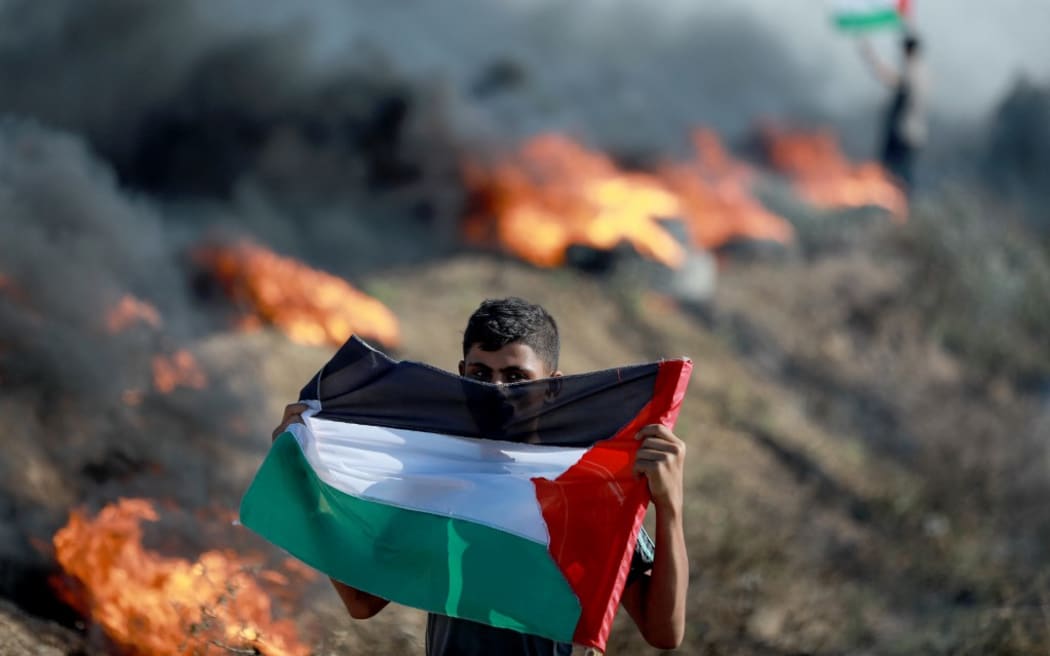
A Palestinian holds a flag during a protest against the Israeli army raid in Jenin, along the Israel-Gaza border fence east of Gaza City on 3 July, 2023. Photo: AFP / Majfi Fathi
The Israeli military said its forces struck a building that served as a command centre for fighters from the Jenin Brigades with what it called "precise" drone strikes using small payloads. It described the operation as an extensive counterterrorism effort aimed at destroying infrastructure and disrupting militants from using the refugee camp as a base.
As the operation proceeded, Israeli armoured bulldozers ploughed up roads in the camp to dig up concealed improvised explosive devices, cutting water and electricity supplies, the Jenin municipality said as residents described soldiers breaking through the walls to pass from house to house.
"Nothing is safe in the camp. They dug up the roads with bulldozers. Why? What did the camp do?" said Hussein Zeidan, 67, as he recovered from his wounds in hospital.
In Washington, the State Department said it was closely tracking the situation in Jenin. A State Department spokesperson said it was imperative that all possible precautions be taken to prevent the loss of civilian lives.
An Israeli military spokesman said the operation would last as long as needed and suggested forces could remain for an extended period. "It could take hours, but it could also take days. We are focused on our goals," he said.
Until 21 June, when it carried out a strike near Jenin, the Israeli military had not used drone strikes in the West Bank since 2006. But the growing scale of the violence and the pressure on ground forces meant such tactics may continue, a military spokesman said.
"We're really stretched," a spokesman told journalists. "It's because of the scale. And again, from our perception, this will minimise friction," he said, adding that the strikes were based on "precise intelligence".
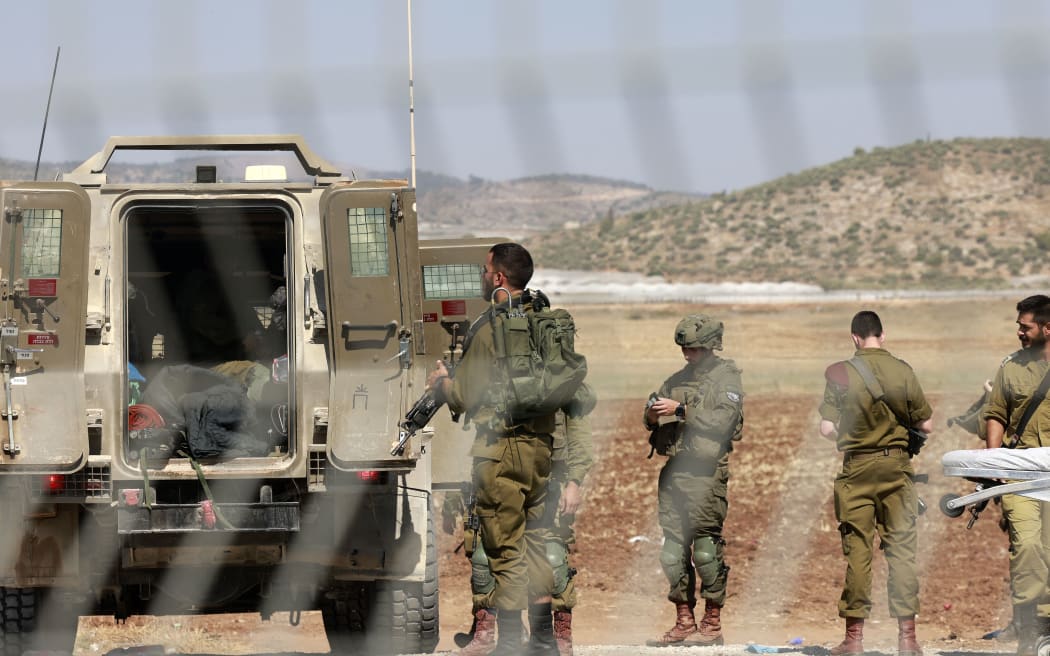
Israeli forces await the evacuation of a wounded soldier in the Israeli town of Muqeibila, north of the occupied West Bank during the raids on Jenin. Photo: AFP / Menahem Kahana
Israeli forces hit the city of Jenin with drone strikes on Monday as part of one of the biggest West Bank operations in 20 years, killing at least eight Palestinians and involving hundreds of troops in sporadic gun battles that continued into the evening.
Gunfire and explosions were heard throughout the day as clashes continued between Israeli troops and fighters from the Jenin Brigades, a unit made up of militant groups based in the city's crowded refugee camp.
"What is going on in the refugee camp is real war," said Palestinian ambulance driver Khaled Alahmad. "There were strikes from the sky targeting the camp, every time we drive in, around five to seven ambulances and we come back full of injured."
At times during the morning, at least six drones could be seen circling over the city and the adjoining camp, a densely packed area housing around 14,000 refugees in less than half a square kilometre.
The camp has been at the heart of an escalation of violence across the West Bank that has triggered mounting alarm from Washington to the Arab world, without so far opening the way to a resumption of political negotiations that have been stalled for almost a decade.
For more than a year, army raids in cities such as Jenin have become routine, while there have been a series of deadly attacks by Palestinians against Israelis and rampages by Jewish settler mobs against Palestinian villages.
The Palestinian health ministry confirmed at least eight people had been killed and more than 50 wounded in Jenin, while another man was killed in Ramallah overnight, shot in the head at a checkpoint.
A Palestinian holds a flag during a protest against the Israeli army raid in Jenin, along the Israel-Gaza border fence east of Gaza City on 3 July, 2023. Photo: AFP / Majfi Fathi
The Israeli military said its forces struck a building that served as a command centre for fighters from the Jenin Brigades with what it called "precise" drone strikes using small payloads. It described the operation as an extensive counterterrorism effort aimed at destroying infrastructure and disrupting militants from using the refugee camp as a base.
As the operation proceeded, Israeli armoured bulldozers ploughed up roads in the camp to dig up concealed improvised explosive devices, cutting water and electricity supplies, the Jenin municipality said as residents described soldiers breaking through the walls to pass from house to house.
"Nothing is safe in the camp. They dug up the roads with bulldozers. Why? What did the camp do?" said Hussein Zeidan, 67, as he recovered from his wounds in hospital.
In Washington, the State Department said it was closely tracking the situation in Jenin. A State Department spokesperson said it was imperative that all possible precautions be taken to prevent the loss of civilian lives.
An Israeli military spokesman said the operation would last as long as needed and suggested forces could remain for an extended period. "It could take hours, but it could also take days. We are focused on our goals," he said.
Until 21 June, when it carried out a strike near Jenin, the Israeli military had not used drone strikes in the West Bank since 2006. But the growing scale of the violence and the pressure on ground forces meant such tactics may continue, a military spokesman said.
"We're really stretched," a spokesman told journalists. "It's because of the scale. And again, from our perception, this will minimise friction," he said, adding that the strikes were based on "precise intelligence".
Israeli forces await the evacuation of a wounded soldier in the Israeli town of Muqeibila, north of the occupied West Bank during the raids on Jenin. Photo: AFP / Menahem Kahana
'Hornets nest'
Monday's operation, involving a force described as "brigade-size" - suggesting around 1000-2000 troops - was intended to help "break the safe haven mindset of the camp, which has become a hornets nest", the spokesman said.
Its apparent scale underlined the importance of the Jenin camp in violence that has further exposed the impotence of the Palestinian Authority to impose its writ over towns in the West Bank, where it holds nominal governance powers.
Palestinian President Mahmoud Abbas said he was suspending contacts with Israel and called for "international protection for our people". UN Middle East envoy Tor Wennesland said he was talking with all parties to de-escalate and ensure humanitarian access.
Hundreds of fighters from militant groups including Hamas, Islamic Jihad and Fatah are based in the camp, which was set up 70 years ago to house refugees in the aftermath of the 1948 war that accompanied the creation of Israel. The fighters have an array of weapons and a growing arsenal of explosive devices.
The Israeli military, which regularly accuses militant groups of basing fighters in civilian areas, said troops seized an improvised rocket launcher and hit a weapons production and explosives storage facility with hundreds of devices ready to be used as well as radios and other equipment.
It said it had also found weapons in a mosque where fighters had barricaded themselves inside in an underground section.
It was unclear whether the incursion would trigger a wider response from Palestinian factions, drawing in militant groups in the Gaza Strip, the coastal enclave controlled by militant Islamist group Hamas.
Saleh Al-Arouri, accused by Israel of leading the Hamas military wing in the West Bank, told Aqsa TV that fighters in Jenin should try to capture Israeli soldiers.
"Our fighters will rise from everywhere, and you will never know where the new fighter will come from," he said.
Israeli Defence Minister Yoav Gallant said his forces were "closely monitoring the conduct of our enemies," with the defence establishment "ready for all scenarios."
Following the last major raid in Jenin in June, Palestinian gunmen killed four Israelis near a Jewish settlement in the West Bank. That led to a rampage by mobs of settlers in Palestinian villages and towns.
Israel captured the West Bank, which the Palestinians see as the core of a future independent state, in the 1967 Middle East war. Following decades of conflict, peace talks that had been brokered by the United States have been frozen since 2014.
-Reuters
Monday's operation, involving a force described as "brigade-size" - suggesting around 1000-2000 troops - was intended to help "break the safe haven mindset of the camp, which has become a hornets nest", the spokesman said.
Its apparent scale underlined the importance of the Jenin camp in violence that has further exposed the impotence of the Palestinian Authority to impose its writ over towns in the West Bank, where it holds nominal governance powers.
Palestinian President Mahmoud Abbas said he was suspending contacts with Israel and called for "international protection for our people". UN Middle East envoy Tor Wennesland said he was talking with all parties to de-escalate and ensure humanitarian access.
Hundreds of fighters from militant groups including Hamas, Islamic Jihad and Fatah are based in the camp, which was set up 70 years ago to house refugees in the aftermath of the 1948 war that accompanied the creation of Israel. The fighters have an array of weapons and a growing arsenal of explosive devices.
The Israeli military, which regularly accuses militant groups of basing fighters in civilian areas, said troops seized an improvised rocket launcher and hit a weapons production and explosives storage facility with hundreds of devices ready to be used as well as radios and other equipment.
It said it had also found weapons in a mosque where fighters had barricaded themselves inside in an underground section.
It was unclear whether the incursion would trigger a wider response from Palestinian factions, drawing in militant groups in the Gaza Strip, the coastal enclave controlled by militant Islamist group Hamas.
Saleh Al-Arouri, accused by Israel of leading the Hamas military wing in the West Bank, told Aqsa TV that fighters in Jenin should try to capture Israeli soldiers.
"Our fighters will rise from everywhere, and you will never know where the new fighter will come from," he said.
Israeli Defence Minister Yoav Gallant said his forces were "closely monitoring the conduct of our enemies," with the defence establishment "ready for all scenarios."
Following the last major raid in Jenin in June, Palestinian gunmen killed four Israelis near a Jewish settlement in the West Bank. That led to a rampage by mobs of settlers in Palestinian villages and towns.
Israel captured the West Bank, which the Palestinians see as the core of a future independent state, in the 1967 Middle East war. Following decades of conflict, peace talks that had been brokered by the United States have been frozen since 2014.
-Reuters
Thousands flee Jenin as Israel indicates terror crackdown will continue
IDF denies reports it ordered evacuation of West Bank city, as Palestinians stream out of refugee camp and Israeli reinforcements move in
Thousands of Palestinians streamed out of the Jenin refugee camp in the West Bank on Monday night to escape fighting as Israeli forces pushed ahead with a major anti-terror operation.
The Palestinian Red Crescent emergency services group said 3,000 people had been evacuated from the densely populated quarter of the city.
“There are about 3,000 people who have left the camp so far,” Jenin deputy governor Kamal Abu al-Roub told AFP, adding that arrangements were being made to house them in schools and other shelters in the city of Jenin. He said about 18,000 Palestinians reside in the camp
Juliette Touma, spokeswoman for the United Nations agency for Palestinian refugees, confirmed to AFP that residents of the camp were leaving.
Footage released by Palestinian media showed crowds walking out of Jenin, some moving past Israeli military vehicles.
Palestinian media reports also said the military was deploying reinforcements to Jenin. In footage shared online, a large convoy of army vehicles, including bulldozers, were seen entering the area Monday evening.
Israeli officials denied ordering an evacuation after Palestinian media said the IDF had instructed residents to leave the area. The IDF’s Arabic language spokesperson, Avichay Adraee, said the evacuation reports were “baseless.”
Defense officials told the Ynet news site that the Israel Defense Forces did not issue an evacuation order, and that the Jenin residents were fleeing to escape the fighting. Hundreds of armed terrorists were holed up in the refugee camp, the officials said, stoking fears among residents they could be caught in the crossfire.
Israel launched the major operation early Monday to crack down on what it says is a hotbed of terror in the city. A number of attacks on Israelis in recent years have been carried out by Palestinians from the area, and observers say the Palestinian Authority has little control on the ground.
Over 1,000 IDF troops were involved in the campaign, which appeared to be the largest in the West Bank in some 20 years. Officials quoted in Hebrew-language media predicted the campaign would continue into Monday night, but likely be over within a a short time.
The IDF said the operation began shortly after 1 a.m. on Monday, with a series of airstrikes against multiple targets in the city, including a joint war room shared by various armed groups in the city.
Throughout the operation on Monday, IDF troops searched for weapon storage sites, explosives labs, and other “terror infrastructure”; clashed with armed Palestinians; and carried out airstrikes against various targets in the refugee camp, the IDF said in a statement.
Palestinian health officials said early Tuesday morning that nine people were killed and at least 100 others were wounded, including 20 listed in serious condition, during the strikes and in clashes with Israeli forces, which continued into the night.
Several of the slain Palestinians were identified by media reports as members of armed groups in the city, although there was no immediate official statement issued by Islamic Jihad or other local terror organizations.
Operation to continue
Israeli political and security leaders are in agreement to continue with the counter-terror operation, the Kan public broadcaster reported earlier Monday.
“There are still many goals that Israel wants to achieve,” a security official told the network, adding that messages were being sent to Gaza and Lebanon, warning terror groups to stay out of the fighting.
The major military operation will not be a one-off raid, a top general said Monday.
“This operation doesn’t stand on its own. This day doesn’t stand on its own,” the chief of the military’s Central Command, Maj. Gen. Yehuda Fox, told reporters at the Salem checkpoint, some 10 kilometers (6.2 miles) from Jenin.
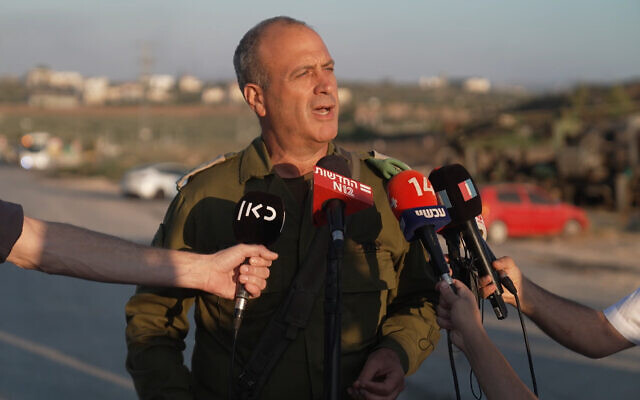
“There is a series of operations here, just like we were here a week ago and two weeks ago. We will finish this operation, and we will come back in a few days or a week, and we will not abide [Jenin] being a city of refuge for terror,” Fox said.
“This isn’t a limited engagement. We want to improve the security and increase our freedom of action,” he added.
Prime Minister Benjamin Netanyahu huddled with Defense Minister Yoav Gallant and the heads of the IDF and Shin Bet Monday evening to discuss the operation. Netanyahu hailed the campaign as a game-changer against terror.
“In recent months, Jenin has become a haven for terrorism — we are putting an end to it,” Netanyahu said, noting that Israeli forces had killed several gunmen, arrested others, and found and destroyed a host of weapon and bomb-making facilities, some of them “on an industrial scale.”
Netanyahu pointed out that the forces were operating in a densely populated area and “they are doing it with minimal harm to civilians.”
The premier claimed that the operation would change “the equation against terrorism” and compared it to the recent operation against Islamic Jihad in Gaza in May and the May 2021 Guardian of the Walls operation against Gaza-based terrorists.
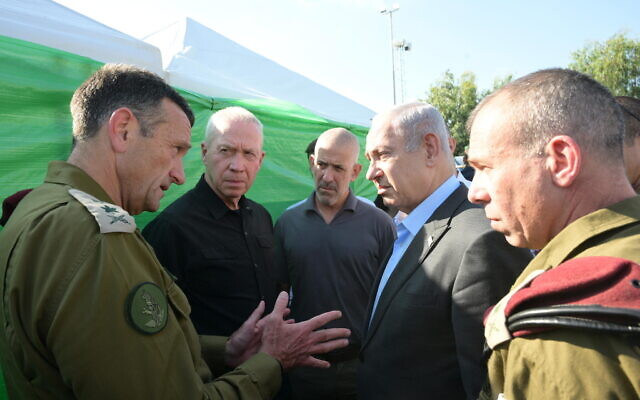
Leaders of the Hamas and Islamic Jihad terror groups urged Palestinians to join the fighting against the IDF, with some Gaza-based fighters threatening to get involved.
Preparing for possible rocket fire from the Gaza Strip, authorities canceled a large concert in the southern city of Sderot, but issued no other precautions. Over the past year, Islamic Jihad has launched rockets at Israel from Gaza in response to members being killed or arrested in the West Bank.
The IDF said that since the early hours of Monday, troops questioned over 100 Palestinian suspects. Several of them were released, while others were taken in for additional questioning.
The IDF said Border Police troops also shot a wanted Palestinian man during the operation. The suspect was taken by military forces to a hospital in Israel for treatment, before he was to be questioned.
One Israeli soldier was lightly hurt during the fighting, after being hit by shrapnel from a grenade hurled by other Israeli forces. The IDF said First Sgt. “Ayin,” from the elite Duvdevan unit — who can only be identified by his rank and initial of his first name in Hebrew — “insisted” on returning to his unit after being treated.
More than 300 explosive devices were seized and demolished by troops during the operation, and the military carried out some 20 drone strikes across the city and Jenin refugee camp, the IDF said.
The IDF also published footage showing members of the elite Maglan unit clashing with Palestinian gunmen in Jenin early on Monday morning.
‘Home and Garden’
Internally, the military has referred to the operation by name, calling it “Bayit Vegan,” literally Home and Garden, a reference to Jenin’s biblical name, a term used by Netanyahu as well. But the IDF Spokesperson’s Unit has insisted that the operation has no official name.
The military appeared to be downplaying the scale of the campaign by not giving it a name. IDF spokesman Rear Admiral Daniel Hagari called it a “brigade-level raid.”
For weeks, there was speculation about a major Israeli military operation in the West Bank, following a string of shooting attacks and intense resistance to IDF raids in Palestinian cities.
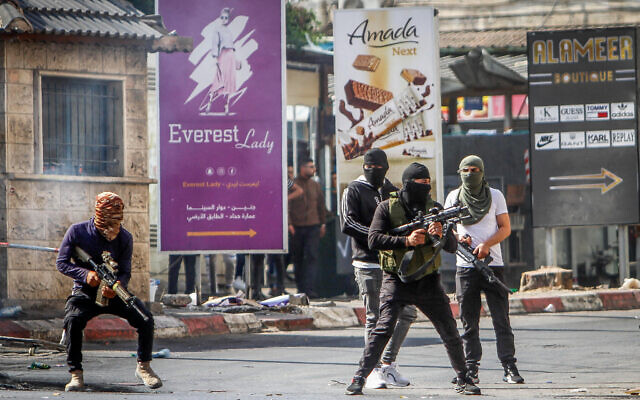
Last month, an Israeli military drone struck a car carrying three Palestinian gunmen who had just opened fire at a checkpoint in the northern West Bank near Jenin, marking the first targeted killings in the West Bank since 2006.
That incident came days after attack helicopters were used in a military raid in Jenin, in which seven Palestinians were killed, including two teens, and eight soldiers were injured by a large roadside bomb and in clashes with Palestinian gunmen.
Last week, Palestinians in the Jenin area attempted to launch two homemade rockets at Israeli towns, footage showed. The rockets landed in Palestinian-controlled territory in the northern West Bank and did not reach Israel. A makeshift rocket was located during Monday’s operation in Jenin.
The northern West Bank, and especially the city of Jenin and its environs, has long been considered by the IDF as a hotbed of terrorism, highlighted by a string of attacks in early 2022, many of which were carried out by residents of the area.
According to the IDF, since last year, some 50 shooting attacks were carried out by residents of the area, and 19 wanted Palestinians escaped to Jenin to seek refuge there from Israeli forces.
Tensions between Israelis and Palestinians have been high across the West Bank for the past year and a half, with the military carrying out near-nightly raids, amid a series of deadly Palestinian terror attacks.
Since the beginning of this year, Palestinian attacks in Israel and the West Bank have killed 24 people.
According to a tally by The Times of Israel, 144 West Bank Palestinians have been killed during that time — most of them during clashes with security forces or while carrying out attacks, but some were uninvolved civilians and others were killed under unclear circumstances.
AFP contributed to this report.
Israeli forces kill at least nine Palestinians in the occupied West Bank as major military operation continues in the Jenin refugee camp.
Israeli forces block medics trying to help injured Palestinians
By Arwa Ibrahim
Published On 3 Jul 2023
Israel’s bloody incursion against Palestinians in the occupied West Bank continues with growing calls for the protection of civilians and fears the tense situation could explode into another devastating war.
The ground-and-air attack on the Jenin refuge camp on Monday was the largest military operation in the occupied territory since the 2000-2005 Second Intifada – or mass Palestinian uprising against Israel’s decades-long occupation.
The ongoing incursion killed at least eight people including two children. A ninth Palestinian was also shot dead by Israeli soldiers near Ramallah.
Nidal Obeidi, the mayor of Jenin, said the attack was “a real massacre and an attempt to wipe out all aspects of life inside the city and the camp”.
“Those being targeted now are not just the resistance fighters but civilians are being killed and wounded as well,” he told Al Jazeera.
The municipality of Jenin announced water and electricity services had been cut off from the refugee camp because of ongoing combat. The Palestine Red Crescent said at least 3,000 people were evacuated from Jenin.
Deploying hundreds of forces, attacking from the sky with drones, and launching rockets on the densely populated camp of about 20,000 people, the Israeli military also targeted infrastructure by destroying homes and roads.
The hotbed of resistance against the Israeli occupation has repeatedly been a focus. At least seven Palestinians were killed in an Israeli incursion in Jenin just two weeks ago.
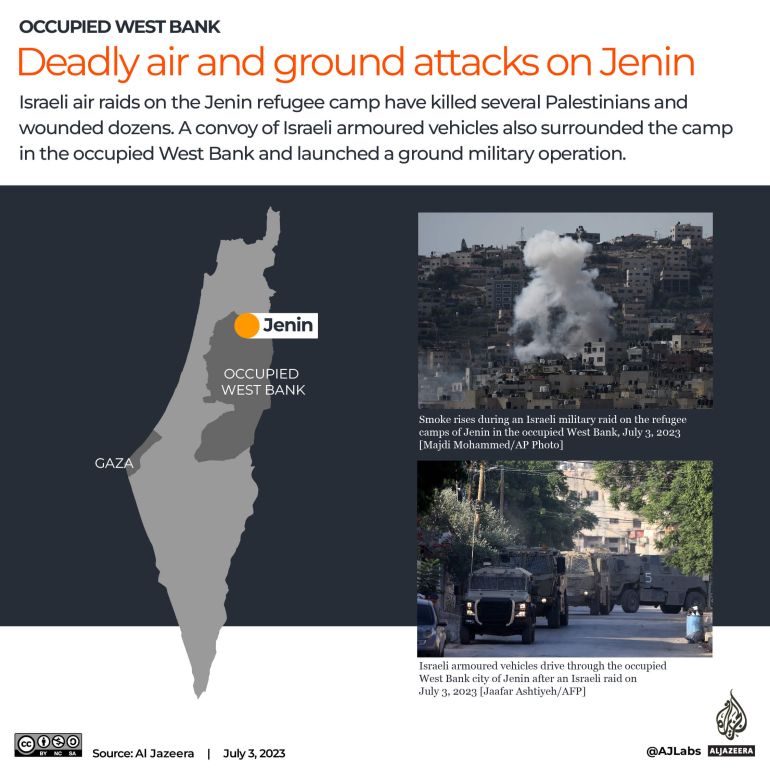
Children killed, journalists targeted
Israeli Foreign Minister Eli Cohen said Tel Aviv is not intending to expand its operation to the rest of the occupied West Bank, but armed confrontations between Israeli troops and Palestinian fighters near the refugee camp continued and the military sent reinforcements.
Palestinian fighters were holed up in a mosque, the Israeli military said, adding the operation would continue until suspects belonging to armed groups were captured, which might require another 24 hours to complete.
The two young victims in Jenin were identified as Nouruddin Husam Yousef Marshoud, 15, and 17-year-old Majdi Younis Saud Ararawi, according to the group Defense for Children International–Palestine. The oldest of Monday’s nine victims was 23-year-old Mohammed Muhannad al-Shami.
Several journalists said they were directly targeted by Israeli live fire while reporting on the events in Jenin.
Al Araby TV channel correspondent Ahmed Shehadeh said the army destroyed his camera with gunfire while he and four other journalists were stuck inside one of the homes in the camp for two hours before being evacuated by the Red Crescent.
It was not the first time media members have become victims in Jenin.
Al Jazeera journalist Shireen Abu Akleh, 51, was killed by Israeli soldiers while reporting on a military raid on the camp last year. The Palestinian-American correspondent was shot in the head while wearing a blue flak jacket clearly marked with the word “PRESS”.
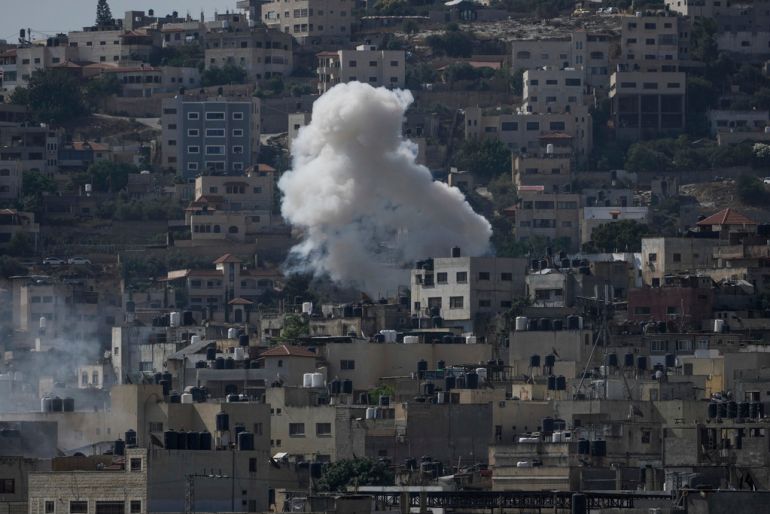
Israel’s attacks on Jenin are part of an effort to crush resistance there with young Palestinians increasingly taking up arms. According to analysts, Israel’s hard-right government is likely to continue its heavy-handed approach towards Palestinians in the occupied West Bank.
“Israel wants to do whatever it can to crush Jenin and any other form of resistance,” said Palestinian lawyer and analyst Diana Buttu.
“They [Israel] have made clear that there are three options available for Palestinians. Option one is to leave, option two is to remain as residents but not as citizens of any state, and option three is if you resist we are going to crush you. This is what they are implementing.”
Hassan Ayyoub, a Palestinian political science professor at An-Najah National University in Nablus, agreed.
“The endgame is to make Palestinians give up any hope of achieving self-determination or being recognised as a people,” Ayyoub said.
The trajectory of the situation since the 2008 assault on the Gaza Strip has been one of continuous escalation by Israel against the Palestinians, he added. Israel intends to crush what he referred to as the “Jenin phenomenon”, or any form of Palestinian resistance.
“Jenin has a long history of resistance. It is a model for the masses that Israel wants to eliminate. But for Palestinians, the question is a matter of principle and their endgame is to end this occupation,” explained Ayyoub.
The Israeli aggression also raised fears of an escalation with armed groups in the Gaza Strip as Gaza-based political factions called on Palestinians to rally around those targeted in Jenin.
Strong condemnation
Many in the international community strongly condemned the Israeli raid and demanded an immediate halt.
Turkey’s foreign ministry voiced its deep concern over the attack, warning the tensions could “trigger a new spiral of violence”. The Organisation of Islamic Cooperation called the Israeli incursion a “heinous crime”.
Qatar stressed the need for the international community to move urgently to protect the Palestinian people against “flagrant” Israeli violations.
Jordan condemned the escalation as a “violation of international humanitarian law”, while Egypt warned of serious repercussions and called on international actors to intervene.
United Nations Middle East envoy Tor Wennesland described the situation as “very dangerous” and called for the protection of civilians.
The White House, meanwhile, said the United States “supports Israel’s security and right to defend its people against Hamas, Palestinian Islamic Jihad and other terrorist groups”, also highlighting the need to protect non-combatants.
The Jenin refugee camp has been the target of intensifying and recurring attacks by Israeli forces over the past two years.
Along with Nablus, it has witnessed the emergence of a new generation of Palestinian fighters resisting Israel’s decades-long military occupation.
The emergence of the new fighting groups came on the heels of a popular outburst of Palestinian resistance in May 2021, which began in occupied East Jerusalem’s Sheikh Jarrah neighbourhood and led to Israel’s 11-day assault on Gaza.
KEEP READING
The weird US-Israel relationship just got weirder
UN 'deeply concerned' over Israeli army raid in Jenin refugee camp
UN Secretary-General Antonio Guterres says "all military operations must be conducted with full respect for international humanitarian law".

AA
Nine Palestinians have been killed by Israeli army fire in the occupied West Bank early on Monday, including eight in Jenin. / Photo: AA
UN Secretary-General Antonio Guterres has expressed deep concern about the developments in the occupied West Bank city of Jenin.
"The Secretary-General is deeply concerned about the developments in Jenin," said his deputy spokesperson Farhan Haq in a statement on Monday.
"He affirms that all military operations must be conducted with full respect for international humanitarian law," said the statement.
Earlier, Haq opted not to condemn the Israeli attacks, instead called for restraint from the parties.
"We want all attacks that hit residential areas, highly populated areas of any sort, to stop," said Haq.
"Israel is able to carry out security operations, it has to do so in such a way that avoids civilian casualties and destruction of civilian infrastructure," said the spokesperson in response to repeated questions seeking a UN condemnation.
Earlier in the day, Tor Wennesland, UN Special Coordinator for the Middle East Peace Process, said on Twitter the escalating tension is very dangerous regarding the Israeli raid.
"The operation comes after months of growing tension that once again reminds us of the extremely volatile & unpredictable situation across the occupied West Bank. All must ensure the civilian population is protected," Wennesland tweeted.
Noting that he is in contact with all parties, Wennesland emphasised the need "to urgently de-escalate the situation & ensure humanitarian access and delivery of necessary medical and other supplies into #Jenin."

'War crimes'
The Council on American-Islamic Relations (CAIR) has condemned "war crimes" against Palestinian civilians in Jenin refugee camp in the occupied West Bank, calling on the US to "take concrete action to stop the Israeli government’s escalating human rights abuses".
"We strongly condemn the war crimes that Benjamin Netanyahu’s racist government is committing against Palestinian civilians in the Jenin refugee camp using American taxpayer dollars, and we call on the State Department to do the same," Nihad Awad, National Executive Director of the Muslim advocacy group, said in a statement.
"Between these ongoing attacks on refugees, violent settler rampages, illegal settlement expansion, the murder of dozens of Palestinian children this year alone, and the refusal to hold anyone accountable for the brazen assassination of American citizen and journalist Shireen Abu Akleh, the Israeli government is completely out of control because it does not expect to face any consequences from the Biden administration," Awad said.
"This must change," he added.
Nine Palestinians were killed by Israeli army fire in the occupied West Bank early on Monday, including eight in Jenin, according to the Health Ministry. At least 50 other Palestinians were injured.
Tensions have been running high across the occupied West Bank in recent months amid repeated Israeli raids into Palestinian towns.
Nearly 190 Palestinians have been killed by Israeli forces since the start of this year, according to the Health Ministry. At least 25 Israelis have also been killed in separate attacks during the same period.
Repeated Israeli raids into Palestinian towns draws international condemnation as tensions run high across the occupied West Bank.

REUTERS
Smoke is seen from Israel's side during a raid on Jenin refugee camp in the Israeli-occupied West Bank. / Photo: Reuters
Türkiye has strongly condemned a military raid carried out by the Israeli army in the occupied West Bank city of Jenin.
“We are deeply concerned that with these attacks, the current tension in the region could trigger a new spiral of violence,” stressed a Foreign Ministry statement, reiterating Türkiye’s call on Israel to act with common sense and stop such actions.
The statement conveyed Türkiye’s condolences to the Palestinian state and public for those who lost their lives in the raid, also wishing a speedy recovery to the injured.
Nine Palestinians were killed by Israeli army fire in the occupied West Bank, including eight in the city of Jenin, according to the Palestinian Health Ministry. At least 50 other Palestinians were injured.
Nearly 190 Palestinians have been killed by Israeli forces since the start of this year, according to the health ministry. At least 25 Israelis have also been killed in separate attacks during the same period.

'State terrorism'
Iran also denounced the Israeli raid, with Foreign Ministry spokesperson Nasser Kanaani describing the assault as “a criminal act and a clear example of state terrorism.”
Kanaani said the Palestinians “have not committed any crime except defending their recognised legal rights and natural rights.”
He said the international community is “responsible for the barbaric attack on the Palestinian nation,” while calling on the Organisation of Islamic Cooperation (OIC) to “act seriously and effectively” to stop the Israeli assaults against Palestinians.
“The latest attacks against the defenceless city of Jenin have shown once again that peace and compromise and normalisation are neither deterrent nor effective in shutting down the war machine of the Zionist (Israeli) regime,” Kanaani noted.
The OIC had earlier condemned the raid in a statement, saying it "constitutes an extension of crimes and organised state terrorism practised by the Israeli occupation against the Palestinian people.”
The Jeddah-based grouping held Israel responsible for “the repercussions of this heinous crime that calls for investigation and accountability.”
It also called on the United Nations Security Council to “take responsibility, enforce its relevant resolutions, put an end to this continuous Israeli terrorism, and provide protection for the Palestinian people.”
The United States, falling short of condemning the incident, said it was "closely monitoring the situation in the West Bank" amid an Israeli military raid in Jenin.
"We support Israel’s security and right to defend its people," a spokesperson for the White House National Security Council said.
Jordan has rejected any notion that it was given advance notice of Israel's large-scale raid against Palestinian factions in the occupied West Bank city of Jenin and has called on the Israel Defense Forces (IDF) to immediately cease operations amid worsening violence.
As Israeli forces conducted rare operations by land and air in the Palestinian territory at the heart of year-long heightened tensions, IDF spokesperson Lieutenant Colonel Richard Hecht told reporters Monday that Jordanian counterparts had been "made aware" of the move via "strategic communications." Hecht declined to go into detail about the nature of such talks.
Reached for comment, however, a spokesperson for the Jordanian Ministry of Foreign Affairs dismissed the remarks as "totally false."
"Jordan was not made aware of the operation by Israel," the spokesperson told Newsweek. "Jordan has repeatedly urged the Israeli government directly and though public announcements to stop all incursions and military operations against Palestinians.
"Jordan has made it clear that reducing the rising tension in the occupied territories will not be achieved through military operations on Palestinian cities," the spokesperson added, "but through a broad political process that creates political horizons, restores hope and eases the economic pressures on Palestinians."
The spokesperson further asserted that "Jordan condemns the current attack on Jenin and urges Israel to stop it immediately."
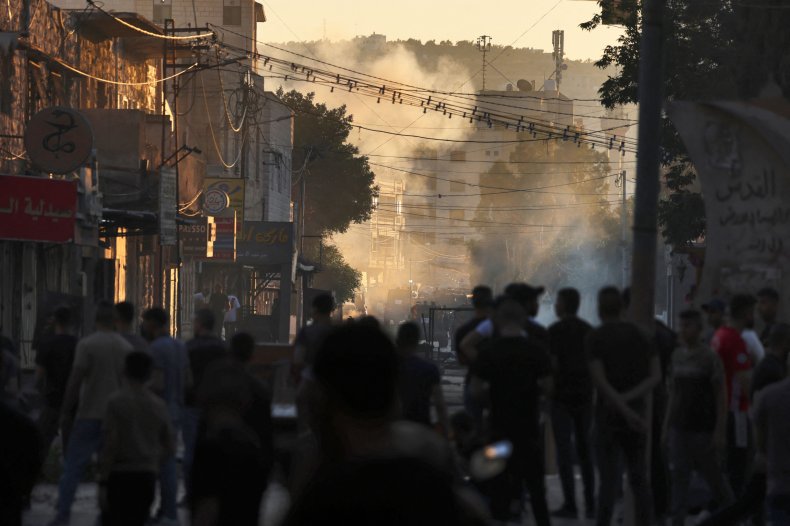
But the situation showed little sign of de-escalation throughout the day as the IDF conducted new drone strikes and land raids against sites suspected of financing and arming self-styled resistance factions in restive Jenin. Organized Gaza-based Palestinian factions such as Hamas and Islamic Jihad have rallied for support for Palestinians clashing with Israeli troops, as have independent outfits such as the Nablus-based Lion's Den.
At a later press briefing, IDF spokesperson Rear Admiral Daniel Hagari emphasized that the operation was not "an invasion" and that Israeli personnel were "not intending to stay in the camp." Rather, he argued, the IDF has "acted in the camp against terror."
Responding to Newsweek's question regarding communication with Jordan, Hagari said he did not have the relevant information on hand.
Despite attempts by Israeli officials to justify the operation in Jenin, the actions have drawn regional condemnation, including among the few Arab states that have ties with Israel.
Jordan became the second Arab nation to establish diplomatic ties with Israel in 1994, following Egypt's decision to do so 15 years earlier. Since then, four other Arab states, the United Arab Emirates, Bahrain, Sudan and Morocco, have followed suit as part of the United States-brokered Abraham Accords that began in 2020.
Newsweek has reached out to the embassies of Bahrain, Egypt, Morocco and the UAE for comment.
Israeli Forces Displace Hundreds of Palestinians from Jenin
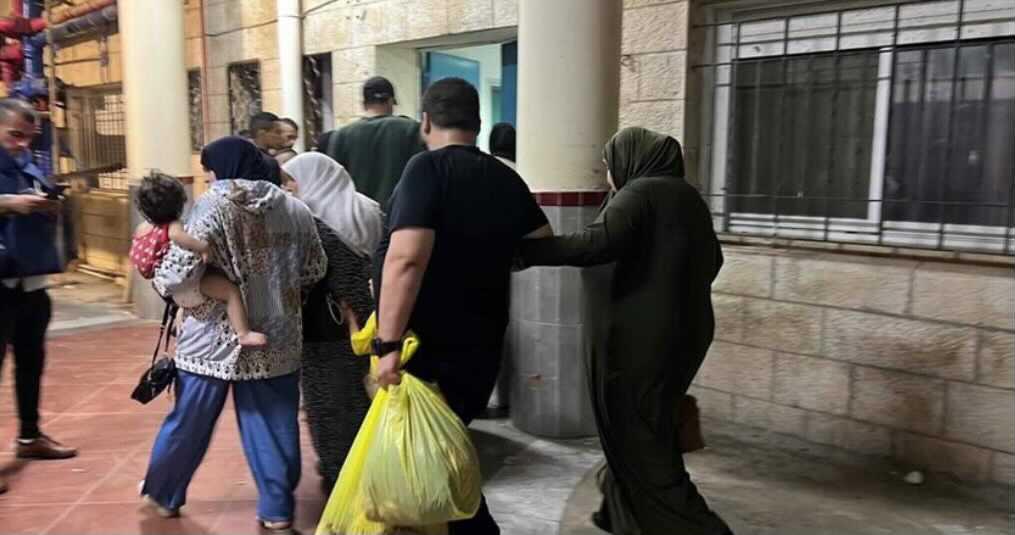
T.Sh | DOP - 3 July, 2023
Israeli Occupation Forces forcibly displaced on Monday, July 3, 2023, hundreds of Palestinians in Jenin, after threatening them to level their houses to the ground.
The Red Crescent teams in Jenin reported successfully evacuating over 500 Palestinian families from within the camp.
However, the teams faced significant challenges in navigating the camp’s debris-strewn streets due to extensive damage caused by the ongoing Israeli onslaught.
According to the Red Crescent, Israeli troops forced 3000 Palestinians to leave their homes.
The Israeli attacks have indiscriminately targeted innocent civilians, resulting in the tragic loss of eight lives, with approximately 100 others sustaining injuries, according to the latest update issued by the Palestinian Ministry of Health.
At dawn, Israeli occupation forces, accompanied by military bulldozers, launched a full-scale incursion into Jenin from multiple directions.
The Israeli troops swiftly besieged the Jenin camp, severing vital road connections between the camp and the city.
Furthermore, they seized control of several residential properties and callously cut off the electricity supply to the besieged camp.
The skies above Jenin and its camp have been filled with the relentless presence of Israeli occupation aircraft, including Apache helicopters and surveillance planes.
The Israeli aircraft continue to carry out intensive airstrikes on various locations within the Jenin camp, resulting in additional casualties among civilians.
The Israeli Occupation’s crime of evicting Jenin residents is added to the occupation’s crimes of uprooting Palestinians from their homes for the first time in 1948, destroying their cities and villages, what they were subjected to in 2002, and what is currently being done to them.
Jenin: What you need to know
Tania Kraemer
DW
Jenin and its refugee camp have seen heightened violence between Israeli forces and Palestinian fighters over past weeks. While Israel claims the operation is to counter terrorism, international observers are concerned.
Where is Jenin?
Jenin is a Palestinian city in the northern part of the Israeli-occupied West Bank. The city is under administration of the Palestinian Authority, which has only limited authority in parts of the West Bank. Israel's ongoing occupation of the West Bank is widely considered a violation of international law.
The Jenin refugee camp, where the Israeli military on Monday launched an attack, killing at last eight, is a densely populated part of the city. It was established in the early 1950s to house Palestinians who fled or were expelled from their homes, mainly from the northern part of the West Bank, during, and in the aftermath of the Israeli-Arab war in 1948. Palestinians refer to this period as the Nakba, the catastrophe.
Israel captured and occupied the West Bank along with East Jerusalem during the Six-Day War in 1967. Palestinians want to see the West Bank, East Jerusalem, and Gaza as integral parts of a future independent Palestinian state. However, any substantial peace talks have been frozen for a decade at least.
Who are the militant groups believed to be active in the area?
Israel claims that the Jenin refugee camp is an operating ground for armed fighters from different militant groups such as the armed wing of Hamas — the Izz ad-Din Qassam Brigades — the Palestinian Islamic Jihad, and the Fatah-affiliated network of Al Aqsa Martyrs' Brigades. Armed with an array of weapons, these groups are designated as terrorist organizations by the European Union and the United States.
Several newer groups have emerged in the West Bank, such as the "Lion's Den" in Nablus or, the so-called "Jenin Brigade," recently founded by a member of the Palestinian Islamic Jihad. It is a group that reportedly brings together members from different factions rather than carrying out the agenda of any particular faction.
Smaller groups like the Lion's Den are at times only loosely affiliated with established militant groups and consist mainly of Palestinian young men who often see no other way out of Israel's military occupation, and who are disillusioned with the Palestinian political leadership.
Why has Jenin been a hotspot for some time?
Israeli offensives and daily raids in the occupied West Bank are nothing new, but they have intensified since last year, after a series of deadly attacks by Palestinians against Israelis in Israel and the West Bank.
Four Israelis killed in West Bank 01:16
Last year, well known Palestinian-American journalist Shireen Abu Akleh, who worked for the Arabic channel Al Jazeera, was killed by gunfire while covering an Israeli military raid near the Jenin refugee camp. In a subsequent investigation, the Israeli military stated there was a "high possibility" that an Israel Defence Forces (IDF) soldier killed Abu Akleh when firing at suspects identified as Palestinian gunmen.
Two weeks ago, a raid by the IDF in Jenin killed at least seven Palestinians, among them militants and civilians. A day later, Palestinian gunmen killed four Israelis near the Israeli settlement of Eli in the occupied West Bank. This was followed by a series of violent rampages by Israeli settlers in Palestinian towns and villages. Israel has since approved plans to build thousands of new homes in Israeli settlements in the West Bank, which are illegal under international law.
According to a report by the United Nations Office for the Coordination of Humanitarian Affairs (OCHA), in the first six months of 2023, Israeli forces killed 147 Palestinians in the West Bank and East Jerusalem, while 23 Israelis were killed in the same time period.
What do Israel and the Palestinians say to recent events?
The Israeli military began the most recent operation on Monday morning with an airstrike on a building which it described as a "command center" reportedly used by Palestinian militants for planning attacks. The military described its action as a "counter-terrorism" operation aimed at seizing weapons and at breaking the "safe haven of the camp" for militants operating there.
The raid came amid growing domestic pressure by members of Israel's far-right government for a tough response to the recent series of attacks.
Palestinian officials in Ramallah have sharply condemned the violence and called for international protection. For many Palestinians, this raid is reminiscent of operation "Defensive Shield" which Israel carried out in Jenin in April 2002. At that time, and after a series of Palestinian attacks in Israel during the Second Intifada ("Uprising”), Israeli forces raided the camp in what was then considered to be one of its largest military operations in the West Bank in years.
Israel carries out large-scale army operation in occupied West Bank 03:36
While the Israeli military said on Monday that it would make efforts to prevent harm to the local civilian population, Palestinian first responders and human rights groups have described the situation in the densely populated refugee camp as extremely difficult and dangerous.
Edited by: Maren Sass
Shocking Video: Israeli Occupation Forces Execute 3 More Palestinians in Occupied Jenin
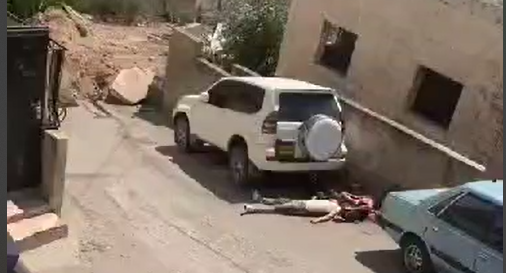
Israeli occupation forces shot and critically wound three Palestinians on Monday morning in Al-Damej neighborhood in Jenin, in the occupied West Bank, according to local sources.
The sources said that Israeli occupation forces opened fire at a group of Palestinians who were protesting against a military raid on Jenin refugee camp, where eight Palestinians were killed earlier in the day.
A graphic video circulated on social media showed the three wounded Palestinians lying on the ground, bleeding and motionless, as Israeli occupation forces prevented ambulance crews and bystanders from reaching them.
The Palestinian Red Crescent Society (PRCS) said that its paramedics were denied access to the scene by the Israeli forces, who also fired tear gas and stun grenades at them.
The PRCS condemned the Israeli actions as a “grave violation of international humanitarian law and human rights”, and called for an immediate intervention to protect the wounded and allow medical access.
The Palestinian Ministry of Health identified the eight killed Palestinians as Samih Firas Abu al-Wafa, Husam Mohammad Abu Deibeh, Aws al-Hanoun, Nour Eddin Husam Marshoud, Muhammad Muhannad Al-Shami, Ahmed Al-Amer, and Majdi Arawi.
The ministry said that they were shot with live ammunition in different parts of their bodies, and that some of them were left to bleed to death by the Israeli occupation forces.
The ministry also said that at least 25 other Palestinians were injured by Israeli fire during the raid, which sparked clashes between the residents and the invading forces.
Jenin refugee camp is one of the largest and most densely populated camps in the West Bank, home to about 15,000 refugees who fled or were expelled from their villages during the 1948 war that created Israel.
The camp has been a frequent target of Israeli occupation military operations, which have resulted in dozens of casualties and widespread destruction over the years.

Israel's Benjamin Netanyahu. Photo Credit: Fars News Agency
By Ramzy Baroud
Israeli Prime Minister Benjamin Netanyahu is not just against the establishment of a Palestinian state, he wants to eliminate the very aspirations for such a state.
This was the gist of recent remarks made by Netanyahu at a meeting of the Israeli Knesset’s Foreign Affairs and Defense Committee. They were reported in the Israeli media on June 26.
Some, including officials in the Palestinian Authority, seemed oddly surprised following the release of the reports, as if Israel’s intentions regarding Palestinian freedom and statehood are not known even to a political novice.
The official spokesperson for the Palestinian presidency retorted by emphasizing that only an independent Palestinian state can achieve “security” and “stability.”
These two terms are often used by Palestinian officials to induce US sympathy, as such language is borrowed from the American political discourse on Palestine and the Middle East. Practically, the term “security” is almost always linked to Israel and “stability” is related to the US agenda in the region.
For Israel, however, such language is of little urgency, because security, from Tel Aviv’s perspective, is obtained through two different channels: unconditional US support and the security coordination between the Israeli military occupation and the PA.
Both aspects are already satisfied. Tel Aviv is content with this arrangement to the extent that Netanyahu, in his recently reported comments, stressed: “In the areas which (the Palestinian Authority) manages to act, it does the work for us. And we have no interest in it collapsing.” So, Netanyahu sees the PA as another line of defense against the same Palestinians that the PA is supposed to represent.
As for stability, this is of little concern to Israel, for it practically defines stability as complete Israeli dominance over the Palestinians — actually, the whole region.
None of the above assertions are predicated on complex analyses or guesswork but are exacted from official Israeli statements and actions on the ground.
When far-right Israeli Finance Minister Bezalel Smotrich declared in March that there was “no such thing as Palestinians because there’s no such thing as the Palestinian people,” he was not giving a history lecture or merely engaging in hate speech. He was circuitously stating that Israel cannot be held morally, legally or politically accountable for its actions against those who do not exist.
Smotrich’s remarks were consistent with the pogroms carried out by his supporters, the armed and dangerous illegal settlers of the West Bank, against Palestinians in Huwara in February, Turmus Ayya last month and other Palestinian towns and villages.
Neither the Americans nor the Europeans took any punitive action against Smotrich or the gangs of settlers who torched Palestinian homes and cars, killing and wounding many in the process.
However, that is only a microcosm of a larger ailment, whereby Israel says and does what it wants, while the Americans continue to read from an old political script as if nothing has changed on the ground.
Without doubt, US foreign policymakers know only too well that Israel has zero interest in a just and peaceful settlement to its military occupation of Palestine. But if this is the case, why does the US government insist on following the same tired blueprint of urging both sides to reengage in the so-called peace process and return to negotiations?
This mantra has defined the US foreign policy agenda since the early 1990s, when Israel and the Palestine Liberation Organization signed the Oslo Accords. These worsened a bad situation, tripled the illegal settlements and settlers, and made the Palestinian people even more vulnerable, not only to Israeli violence but to the PA’s repression and corruption as well.
Though Oslo was unfair to Palestinians since it operated largely outside acceptable international paradigms and had no enforcement clauses or deadlines, Netanyahu and other Israeli leaders objected to it anyway, because it expected — although symbolically — Israel to behave in a certain manner.
To be told not to build or expand settlements, for example, has always infuriated Netanyahu, who has even lashed out even at his American benefactors many times in the past, most notably under the administration of President Barack Obama.
Israeli leaders feel that they are above any law or expectations emanating from outside, even if these expectations are quite minimal and made by close allies, such as Washington.
Alas, with time, Netanyahu prevailed, not only over any supposed pressure from the US and the international community, but also over the more liberal political forces in his own society.
Now, armed with a stable coalition and immune from any meaningful criticism, let alone tangible consequences for his actions, the Israeli leader feels ready to carry out his right-wing agenda without hesitation.
Netanyahu’s recent remarks are a more emboldened version of the derisive comments made in October 2004 by top Israeli government adviser Dov Weissglas, who explained the true intentions behind the Israeli military deployment in Gaza in 2005. It was an Israeli tactic aimed at “freezing the peace process,” he said.
“And when you freeze that process,” Weissglas told the Israeli newspaper Haaretz, “you prevent the establishment of a Palestinian state, and you prevent a discussion on the refugees, the borders and Jerusalem. Effectively, this whole package called the Palestinian state, with all that it entails, has been removed indefinitely from our agenda.”
Though this “whole package” has indeed been long removed from the Israeli agenda, the country’s leaders kept referencing a Palestinian state anyway, only to satisfy the minimal expectations of US policy. Even Netanyahu played this game on more than one occasion, including his February interview with CNN, during which he argued that a Palestinian state is possible, but only if it has no sovereignty.
Now, Netanyahu is ready to move past that seemingly old language to new political territories, where the very aspiration of an independent Palestine is not permissible.
While Netanyahu’s bad but honest language is likely to invite yet more Israeli violence and Palestinian resistance, it should also bring about greater clarity, shelving, once and for all, the fraudulent discourse of “security,” “stability” and all the rest.

Ramzy Baroud
Senior officials: Jenin operation will continue until all goals are achieved
Operation gets a name - Home and Garden; Netayahu: 'Jenin has become a haven for terrorism - we are putting an end to it'
Itamar Eichner, Yoav Zitun|Yesterday | YNET
Operation in Jenin: Removing 'eyes and ears' of terror factions
Smotrich compromises support for counterterror operation in Jenin, officials say
Senior political officials say that the decision has been made to continue, while not ignoring the negative aspects of continuing such an operation, including damage to civilian infrastructure and causing harm to civilians.
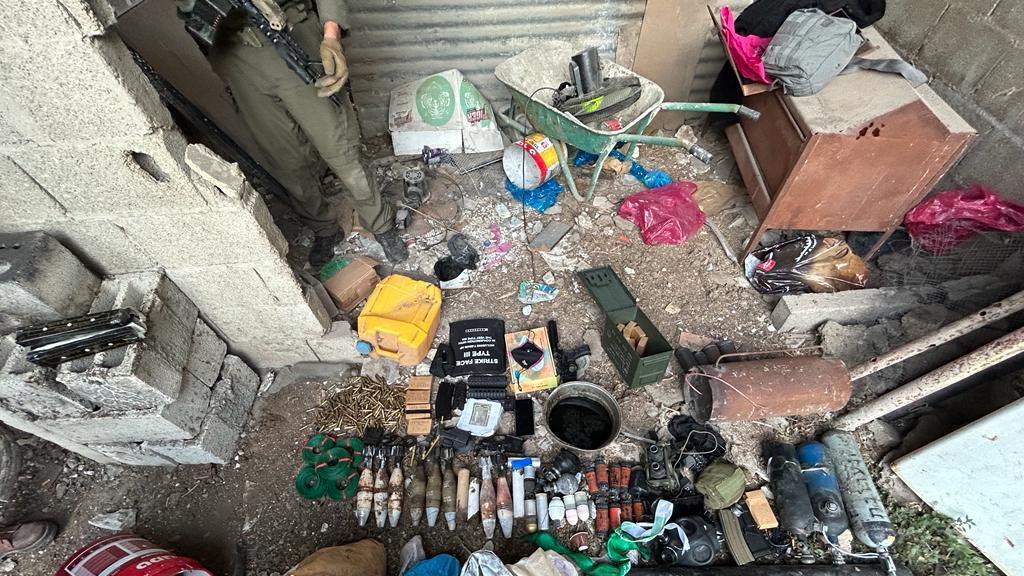
IDF and Shin Bet fighters located and destroyed a laboratory that contained hundreds of explosives and weapons
(Photo: IDF Spokesman's Unit)
At the same time, Palestinian Authority President Mahmoud Abbas on Monday evening announced the end of security coordination due to the operation. This is not the first time that the chairman of the PA has announced this - but Israeli officials do not take it lightly, and it is certainly one of the influencing factors in making the decision as to how far to continue the operation. Israel has no interest in bringing about the collapse of the Palestinian Authority.
In his first statement after the start of the operation in Jenin , and at the end of an assessment of the current security situation, Prime Minister Benjamin Netanyahu said on Monday evening that "in recent months, Jenin has become a haven for terrorism - we are putting an end to it." According to the prime minister, the IDF will continue the operation "as necessary."
Later, in a speech delivered at the US Embassy celebration of Independence Day at the Israel Museum in Jerusalem, Netanyahu for the first time announced the name of the operation – "Operation Home and Garden," although the IDF has so far refrained from defining the incursion in Jenin as an actual operation
Israel sent a message to the international community that there is not a single country in the world that will accept the existence of a sanctuary city that exports terrorism.
"Jenin is engaged in exporting terrorism. If we don't reach them in the Jenin refugee camp, we will meet them in the first stage against our forces, in the second stage in the settlements, in the third stage at the checkpoints and in the fourth stage in Afula and Tel Aviv," the officials told Ynet.
Israel is at the same time sending messages to Lebanon and Gaza: "Stand aside and do not interfere. The operation is limited to Jenin."
The security establishment has refused to specify the end date of the operation in Jenin, but is aware of the dangers that a prolonged stay in enemy territory could bring.
On Monday morning the IDF defined the operation in Jenin that began after midnight as a "division raid" only, and refrained from defining it as an "operation," but it soon became clear that it was not just a raid - a military move in which a force penetrates hostile territory, attacks and retreats - but rather a move that looks like operational on the battlefield.
About a thousand fighters of the IDF's commando brigade and infantry cruisers will begin their second day in Jenin in the coming hours, and no Israeli official is ready to commit to when turn back, after killing at least 10 terrorists, wounding over 70 and arresting dozens of terror suspects.
Meanwhile, thousands of Palestinians have left their homes and are fleeing on foot from the Jenin refugee camp. The Palestinians have charged that the IDF forced hundreds of civilians to evacuate their homes in the area near Al-Hassan Square in the city, calling through loudspeakers to evacuate the homes, and stressing that the families would be evacuated to the hospital yards and the Jenin City Hall.
But security sources say that thousands of Palestinians left their homes on foot in the Jenin refugee camp, where 19,000 people live in an area of half a square kilometer, due to the presence of hundreds of armed terrorists and their fear of continued fighting. The Israeli sources added that the families were not required to evacuate by the IDF, but are doing so out of disgust and fear of the escalation in the camp
According to estimates by the Palestinian Central Bureau of Statistics, as of mid-2023 there were 11,674 Palestinians in the Jenin camp who are defined as refugees.
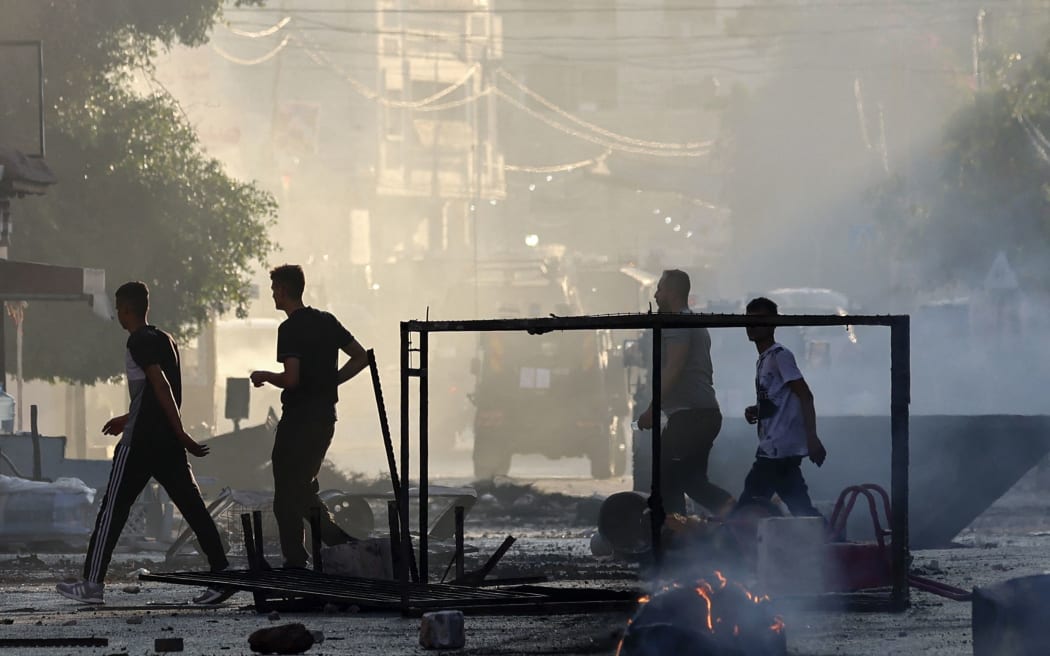
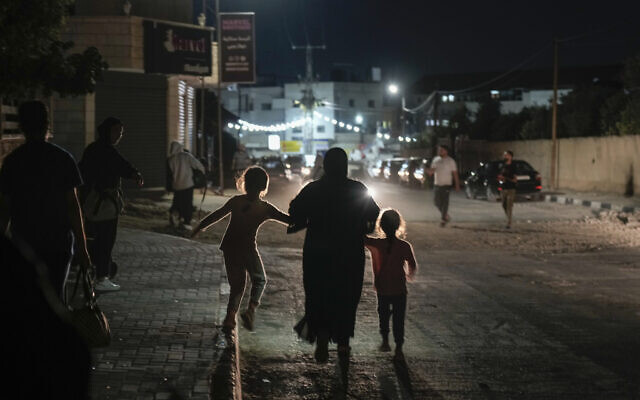
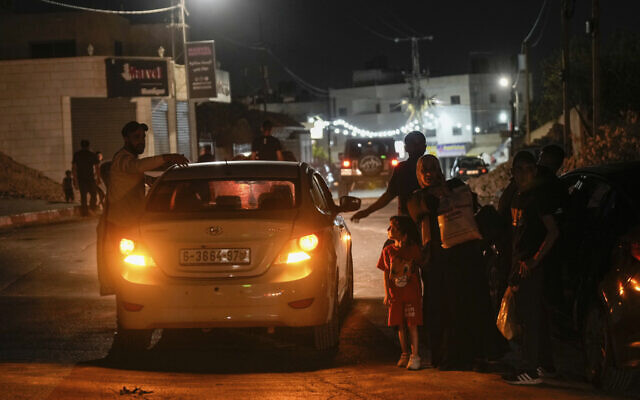
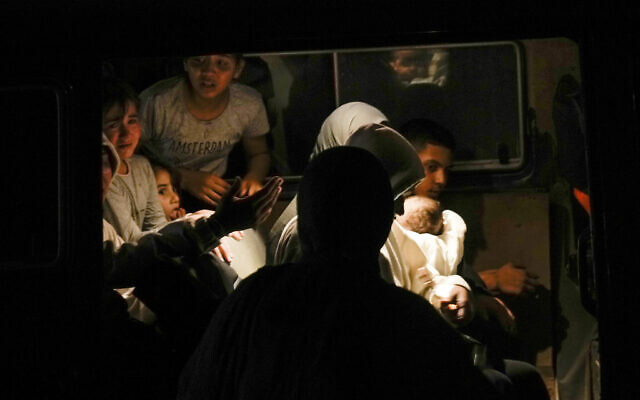
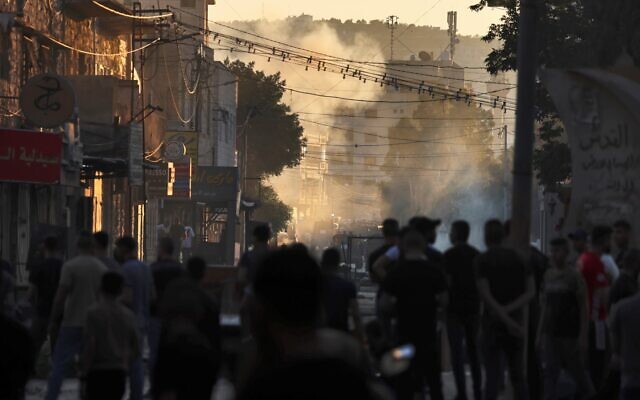
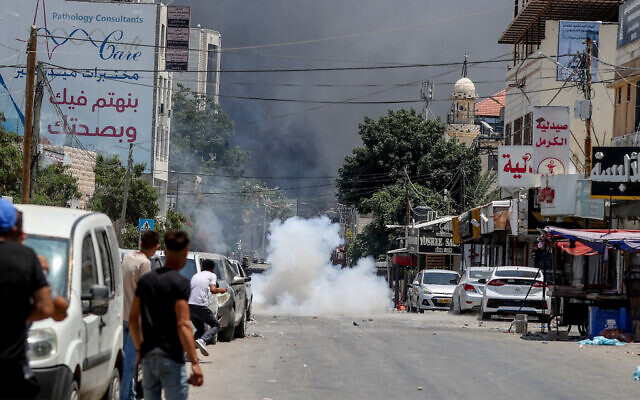
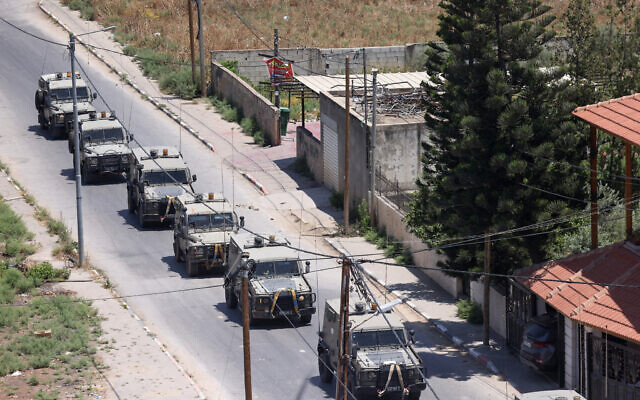
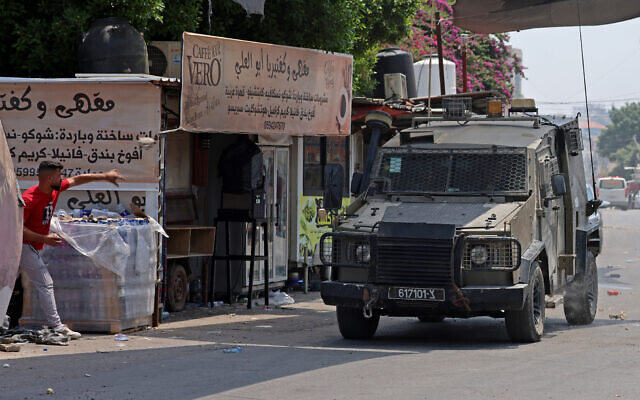
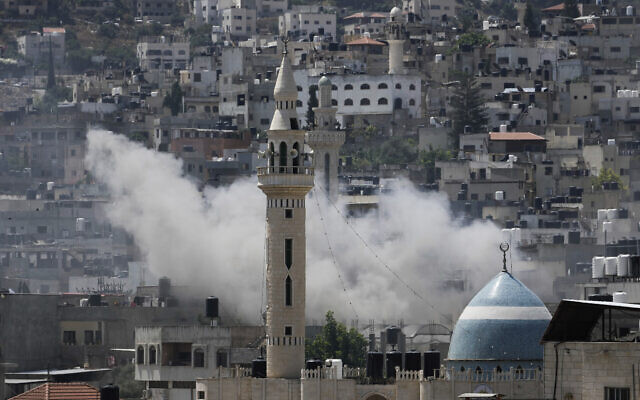
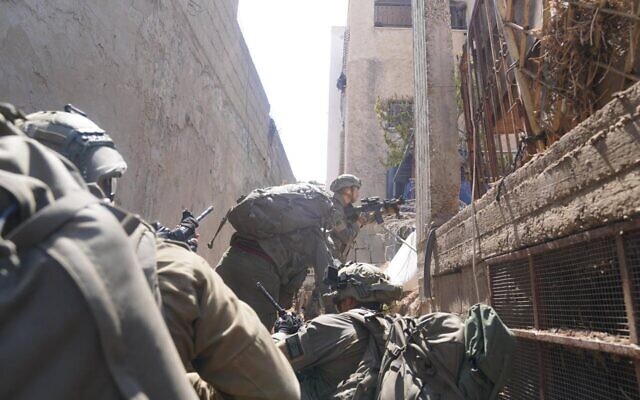
No comments:
Post a Comment